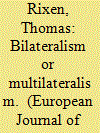| Srl | Item |
| 1 |
ID:
101377


|
|
|
|
|
| Publication |
2010.
|
| Summary/Abstract |
Why do states cooperate bilaterally or multilaterally? This article addresses the issue using the example of international double tax avoidance. It is argued that double tax avoidance exhibits the strategic structure of a coordination game with a distributive conflict. The distribution of tax revenues depends on the asymmetry of investment flows between treaty partners. Since investment flows are defined dyadically, bilateral bargaining can best accommodate countries' concerns for the distribution of tax revenues and other economic benefits connected to the tax base. Moreover, because there are no serious externality problems with bilateral agreement, this solution is also viable. At the same time, there is a need for a multilateral organization to disseminate information and shared practices in the form of a model convention that provides a focal point for bilateral negotiations. This solution minimizes transaction costs. Since agreements are self-enforcing in coordination games there is no need for third-party enforcement. Instead, the Mutual Agreement Procedure (MAP) is a device to address problems of incomplete contracting.
|
|
|
|
|
|
|
|
|
|
|
|
|
|
|
|
| 2 |
ID:
080473


|
|
|
|
|
| Publication |
2007.
|
| Summary/Abstract |
Trade relations are governed by a multilateral agreement, whereas the avoidance of double taxation rests on a network of about 2000 separate bilateral treaties. What accounts for the difference in the institutional form? Distinguishing between the bargaining and agreement stage of international cooperation, we first show that the institutional design of both regimes is more complex than commonly assumed. Both exhibit a mix of bilateral and multilateral bargaining that precedes multilateral agreement in trade and bilateral agreement in taxation. We demonstrate that in both regimes, governmental concerns for the distribution of benefits can best be achieved through bilateral bargaining. Multilateral bargaining serves to reduce the high transaction costs of bilateral bargains. Multilateral agreement in trade helps to overcome the problem of free-riding that results from a particular interaction of concerns on distribution and enforcement problems. Since no such problem exists in double tax avoidance, agreement is therefore bilateral in nature
|
|
|
|
|
|
|
|
|
|
|
|
|
|
|
|
| 3 |
ID:
108960


|
|
|
|
|
| Publication |
2011.
|
| Summary/Abstract |
This article presents the normative case for global tax governance. Contrary to an influential part of the literature, national tax policy choices cause significant externalities for other nation-states. Focusing on business taxation, the article shows that tax competition undermines the integrity and distributive principles of domestic tax systems and aggravates the inequality between developed and developing countries. Further, it demonstrates that the effects of international tax competition are unjust irrespective of whether a globalist or less demanding internationalist perspective on justice is adopted. The minimum requirement of justice is to devise global rules that ensure that national tax systems remain capable of implementing distributive justice as they see fit. Finally, the article presents and discusses a concrete proposal for the global governance of business tax competition, namely, unitary taxation with formula apportionment.
|
|
|
|
|
|
|
|
|
|
|
|
|
|
|
|